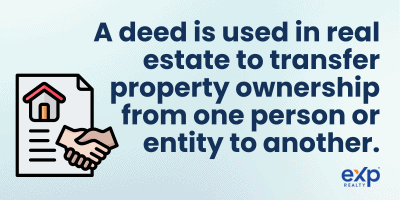The title and the deed are two legal terms you will encounter if you plan on purchasing or selling a property. These terms have different meanings regarding real estate transactions. Making decisions that are well-informed and free of costly errors can both be facilitated by understanding their distinctions.
In this post, we’ll detail what a deed and a title are, how they differ, and why they are essential in real estate. So, let’s get started!
What Is a Deed?

A deed, a legal and physical document, is used in real estate to transfer property ownership from one person or entity to another. Essentially, it’s a written proof of the transfer of title from the seller to the buyer.
The deed frequently contains a legal description of the property, the parties involved in the transfer, and the terms and conditions of the transfer. Some types of deeds you may encounter are general warranty deed, grant deed, special warranty deed, and quitclaim deed.
The purpose of a deed is to provide evidence of the transfer of legal ownership and protect the buyer’s interests. It’s a critical document establishing a chain of title or checking the title abstract, which is the document of property ownership from previous owners.
By recording the deed with the local government, the buyer can establish a legal claim to the property and protect themselves against future disputes or claims like a mortgage or outstanding debts from others who may have a stake in it. In short, the deed is a crucial document in any real estate transaction, and it’s essential that both parties fully understand its terms and implications.
What Is a Title?

In real estate, the title refers to the legal right to own and use a property of the title-holder. A title is a legal concept of ownership that identifies who is legally entitled to own and use a piece of property and any constraints or limitations on that right.
A house title serves as confirmation that the buyer is the rightful owner of the property and that no liens or claims against it are pending that would compromise their ownership rights. Before a real estate transaction, a title search is often performed to ensure that the seller has the legal right to sell the property and that there are no existing encumbrances, such as liens, title defects, or claims against it.
A title search is also part of securing title insurance for ownership dispute protection. Except for any restrictions or limits indicated in the title, the buyer can use and enjoy the property as they see fit once the title has been transferred to them.
The Key Differences Between Deed and Title
Now that you know what the terms “deed” and “title” refers to a different aspect of property ownership, let us identify their differences. Here are some key differences between the two:
Ownership
A title establishes who has the legal right to own and use the property. In contrast, a deed is a legal document that transfers property ownership from one person to another.
Legal Evidence
A deed is legal evidence of ownership, while a title represents proof of ownership. A deed is typically used to transfer ownership from one party to another, while a title is used to verify ownership and protect the buyer’s interests.
Role of Government
The government plays a role in both the recording of deeds and the verification of titles. A deed must be recorded with the government to transfer ownership. In contrast, the government may conduct title searches to verify ownership and ensure no outstanding liens or claims against the property.
Recording
A title is recorded with the government, while a deed must be recorded to transfer ownership. The government keeps a public record of all property titles, which can be accessed by anyone who wants to verify ownership or conduct a title search.
In summary, while a deed and a title are critical components of property ownership, they serve different purposes and are treated differently under the law. Whether purchasing or selling a home or commercial property, it’s crucial to be aware of these distinctions because they may significantly influence your legal responsibilities and rights.
The Importance of Deed and Title in Real Estate Transactions

Deeds and titles play a crucial role in protecting the rights of property owners and ensuring clear ownership in real estate transactions. Here are some ways that deeds and titles can help protect your interests:
Protecting Property Rights
A well-executed deed and title transfer can ensure that you have clear ownership of a property and that your rights as a property owner are protected. By establishing a chain of title and recording the transfer with the government, you can establish a legal claim to the property and protect yourself against any future disputes or claims from others who may have a stake in the property.
Resolving Disputes
Deeds and titles can also provide valuable evidence in property ownership or transfer disputes. By keeping a public record of all property transactions, the government can help resolve disputes like unpaid taxes or improper title transfers between buyers, sellers, and other parties who may have a claim to the property.
The deed and title can be used as proof to support your claim and demonstrate your legal rights to the property in case of an ownership dispute.
Deeds and titles will help protect your interests as a legal owner and ensure clear property ownership. By understanding the role of deeds and titles in real estate, you can make informed decisions and avoid costly mistakes when selling or buying a property.
Key Takeaways

In summary, deeds and titles are critical to any real estate transaction. While they are often used interchangeably, they serve different purposes and are treated differently under the law. A deed is a legal document that transfers property ownership from one party to another. At the same time, a title represents proof of ownership and establishes who has the right to possess and use the property.
Understanding the differences between deeds and titles can help protect your interests as a property owner and ensure a smooth real estate transaction. Deeds and titles can provide legal evidence of ownership, protect property rights, and help resolve disputes.
It’s crucial to remember that real estate legislation can be intricate and differs from county or state to state. Therefore, further research and consulting with professionals such as real estate attorneys or title companies can help ensure a clear understanding of deeds and titles in your situation.
Understanding the role of deeds and titles in real estate is crucial whether you’re buying or selling a property. By working with knowledgeable, professional real estate agents and familiarizing yourself with deeds and titles, you can protect your interests and avoid costly mistakes.
FAQs
Here are frequently asked questions about deeds and titles.
Is the title the same as the deed and mortgage?
No, a title is not the same as a deed or mortgage. A title represents proof of ownership, a deed is a legal document that transfers property ownership from one party to another, and a mortgage is a loan secured by the property.
Is the title the same as ownership?
In general, yes, a title represents ownership of a property. It establishes who has the right to possess and use the property and serves as proof of ownership.
What is the purpose of a deed?
The purpose of a deed is to grant ownership of a property from one party to another. It is a legal document that must be appropriately executed and recorded with the government to establish a transparent chain of title and protect the interests of the parties involved in the transaction.
How do I get a title deed?
You can get a title deed by going through a real estate transaction process, such as buying or inheriting a property. Once the transaction is complete, a title company or attorney can help facilitate the transfer of ownership and record the deed with the government.
What happens to title deeds when the mortgage is paid?
When a mortgage is paid off, the lender will release the mortgage lien on the property and provide the borrower satisfaction with the mortgage document. The borrower will still retain the title to the property, and you should keep a copy of the deed for their records.
Who owns the deeds to a property?
The property owner typically holds the deed to the property, which serves as legal evidence of ownership. In some cases, such as when a property is held in trust or owned jointly, multiple parties may retain a share of the deed.
How important is a title deed?
The title deed is essential because it provides legal proof of property ownership. It establishes who has the right to possess and use the property, and with a clear title, a property’s ownership may be in dispute, making it easier to sell or transfer.
Can a house be sold without a title deed?
No, a house cannot be sold without a title deed. The title deed is a legal document that establishes property ownership and is necessary to transfer ownership to a buyer.
Do you need original title deeds to sell a house?
While it is optional to have the original title deeds to sell a house, establishing a transparent chain of title and recording the necessary documents with the government to ensure a smooth transaction and interest protection of all parties involved is crucial.
Are title deeds legally binding?
Yes, title deeds are legally binding documents that establish property ownership and are enforceable in a court of law. They are essential in real estate transactions and serve as proof of ownership.





